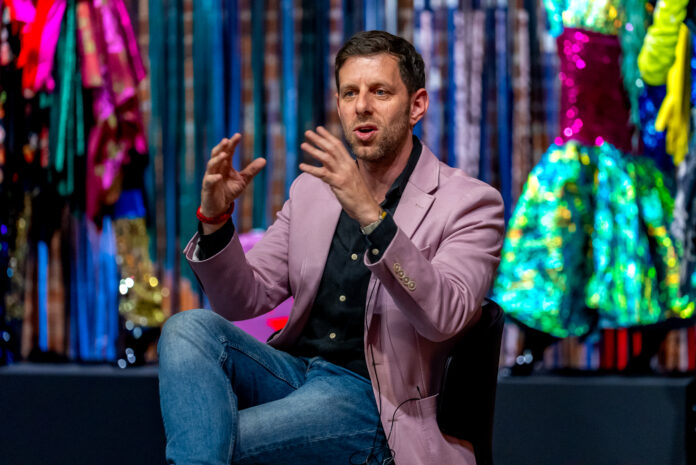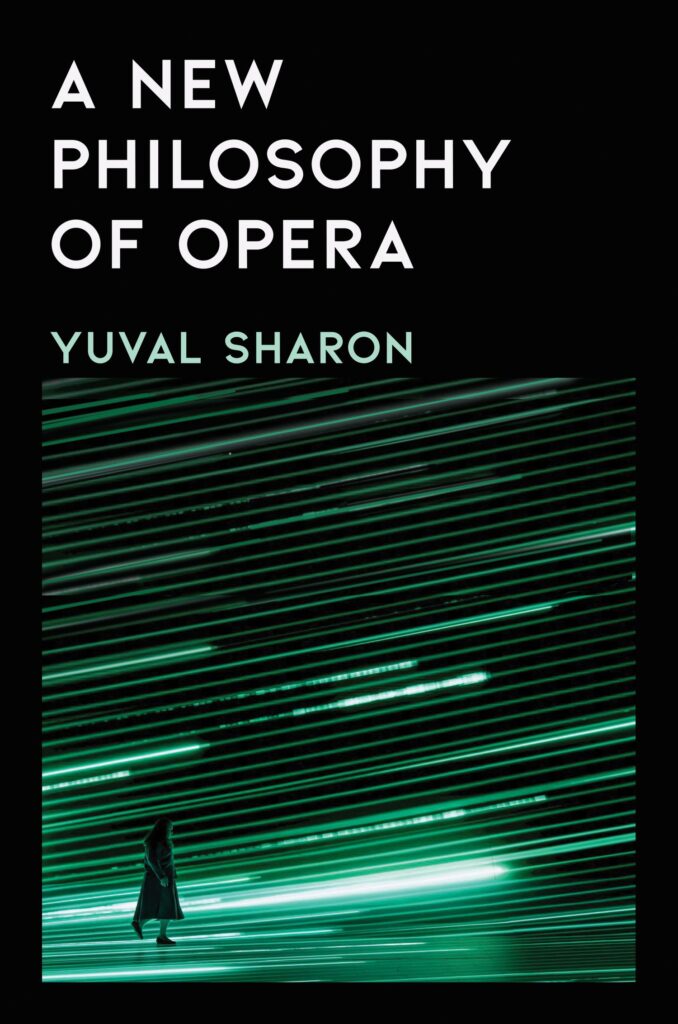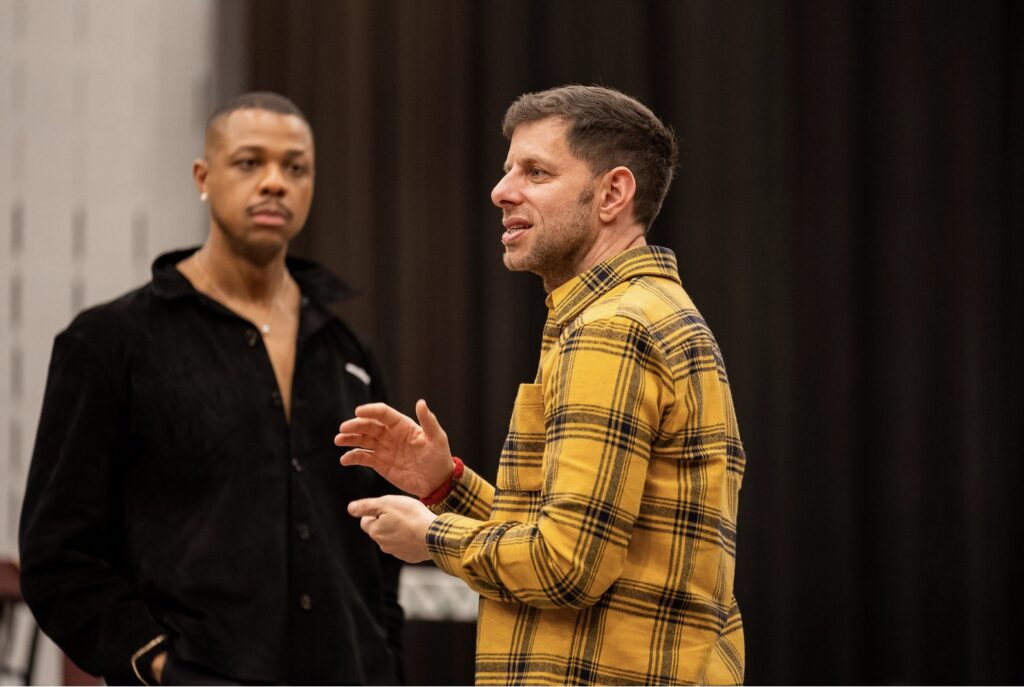
If, as Detroit Opera artistic director Yuval Sharon writes, “rebirth is opera’s true power,” then he embodies that potential, continually reshaping the art form to be more inclusive, innovative and dynamic. At the helm of Detroit Opera, Sharon has revitalized the traditional, in part an effort to make opera accessible and resonant for a wider audience.
My own introduction to seeing Sharon’s work came in 2020, while shelter-in-place restrictions were implemented. That year, I joined my pandemic pod in a Toyota Rav4 to experience his groundbreaking Detroit Opera premiere — a drive-thru performance of “Twilight: Gods,” staged in the Detroit Opera House Parking Center, all seen through car windows on multiple levels of the structure. Who knew opera could thrive in such an unconventional setting? Sharon did. And he’s proven it can, earning global acclaim for his innovative vision right here in the heart of downtown Detroit.
From renaming the company in his first year to radically reimagining productions, Sharon’s efforts have consistently pushed the boundaries of what opera can mean to a modern audience, garnering significant acclaim from critics and audiences alike. The Detroit Free Press commended Sharon’s direction of his reimagining of “Bliss,” stating that “director Yuval Sharon’s whimsical staging captured imaginations almost right away.” Additionally, the Los Angeles Times observed that Sharon’s production of “The Valkyries” at the Hollywood Bowl “makes history again,” emphasizing his ability to bring a “boldly progressive” vision to traditional works.
Sharon’s passion for his craft as artistic director of Detroit Opera is evident not only in the work he produces but also in the modest charm of his office at the Detroit Opera House. The walls and bookshelves are lined with volumes on history and music, offering a glimpse into the depth of his inspiration. On a calm December day, I take in these details while seated at a table beneath a striking poster for “Twilight: Gods,” a vivid reminder of his unwavering “show must go on” mentality during a time when live performance around the globe came to a halt. In the weeks leading up to our conversation, I found myself thinking about opera more than ever before, thanks to Sharon’s ability to transform one of the more traditionally inaccessible art forms into a welcoming invitation — a concept he explores in his new book “A New Philosophy of Opera.”

“Let’s start thinking of opera as evolutionary rather than decaying,” he writes. “Let’s consider the experience of going to the opera as a way of thinking and feeling that will benefit us outside the theater. Let’s start viewing opera as an engine for empathy and awe, and decide to attend a performance with an explorer’s mindset. That means opening ourselves up to the unfamiliar.”
Sharon’s own journey into opera began at adolescence, when his father, while working in Germany, took him to a production of “La Traviata.” Remarkably, for someone now celebrated for his groundbreaking opera productions, Sharon recalls “mostly oscillating between boredom and incomprehension” during the performance, as he recalls in his book. Yet it’s precisely these early experiences that may have fueled his mission to create operas that defy such reactions. After all, it was that “restless teenager” who didn’t “understand a thing of what’s happening onstage” that, as he writes, eventually became “the chairperson of that same opera company’s board of directors.”
Today, Sharon’s productions actively work against feelings of detachment and confusion. His “Twilight: Gods,” for instance, transformed the Ring Cycle as an immersive experience set in a parking structure, bringing opera to life in an unexpected and approachable way. Similarly, his 2021 staging of “Bliss” explored repetition and abstraction in ways that captivated modern audiences, while The Industry’s “Invisible Cities” reimagined opera as a site-specific performance in a bustling L.A. train station in 2013, as the audience freely roamed through an operating train station to engage with the story. These innovative approaches invite audiences into the art form, offering them experiences that are anything but boring or incomprehensible.
For Sharon, he’s walked the line between embracing fearlessness while also honoring opera’s rich traditions. “Part of the education I’ve had so far at this job is, you need the boldness, but you also don’t want to be just a bull in the China shop that’s just destroying everything,” he says. “Twilight: Gods” could’ve sat until restrictions on in-person theatergoing were lifted, but Sharon saw those restrictions as an opportunity. He says he was keen on “doing a project right out of the gate.”
“I really wanted to make sure that my arrival would be part and parcel with a project that acted like a statement of intention, which was despite challenges, despite things feeling like they’re falling apart — and in many ways were falling apart — and needed to clear the way for something new to emerge. That’s exactly when we need art most. Because it can really remind us of our humanity, and that seems so important.”
“Art always adapts to the times,” he adds. “And so I really wanted to make that claim.”
When the Detroit Opera House reopened to the public, Sharon saw the stage as an opportunity to be an engine for the empathy and awe that opera can uniquely evoke. In 2022, Detroit Opera presented his innovative production of Puccini’s “La Bohème,” performed in reverse order from Act IV to Act I, as well as “X: The Life and Times of Malcolm X,” composed by Anthony Davis. For the latter, Sharon championed that work due to Malcolm X’s significant importance in Detroit.
“Those felt like, again, another kind of statement of principles of what I wanted the company to be about,” Sharon explains. “On one hand, we love the classics, we love the tradition, but we have an opportunity every single time we do it to explore it from another perspective.”
Speaking about “La Bohème,” he said, “We all love this opera. We love it so much that we think it works really well backward as well as forward, and let’s try it. Let’s try it to see what we learned from it. And of course, everyone that was part of it gained such an enormous appreciation of the work itself.”
Late last year, it was announced that Sharon would continue his role at Detroit Opera for another four years while stepping away from The Industry, the experimental opera company he founded and led in Los Angeles for nearly 15 years, a move he calls “bittersweet” but practical given that he’s splitting most of his time between Detroit and New York now. He has ambitious “lifetime” projects coming up at The Met, and his partner, a theater producer who graduated from the University of Michigan, lives there. (They met through Detroit Opera.)
“I want everything to be as meaningful as possible,” he says. “I started that company and I was able to bring it along so far. So I feel great about all that. And it feels like it’s a good moment. I just did a project in June there, so it just feels like, let’s end on a high note.”
When we met just weeks after Trump was elected president, Sharon discussed drawing inspiration from an eclectic mix of sources, including political discourse, Beyoncé and Kamala Harris’ belief in shared commonalities. Tilda Swinton was on his mind too.
During an interview with The New York Times, Swinton reflected on Trump’s re-election in a way that deeply resonated with Sharon, as she discussed people’s “innate goodness.”
“I do believe we were all little children, scared little animals once, including all of those people that we’re thinking about,” she told the Times. “I don’t know what happened to them to make them this mean, but we have to contact them somehow.”
For Sharon, he has found his way to connect. This year’s lineup at Detroit Opera reflects his vision of using opera to explore diverse facets of humanity. On Feb. 22, out countertenor Anthony Roth Costanzo stars in Louisa Proske’s reimagined production of “Rinaldo.” On April 5, Sharon debuts his fresh take on Mozart’s “Così fan tutte,” transforming the controversial comedy into a futuristic experiment through the lens of artificial intelligence. Then, beginning May 10, the Opera House will stage “The Central Park Five,” composed by Davis, who won a Pulitzer Prize in Music for the opera. The production tackles themes of racial injustice, resilience and redemption.
“One of the things I really love about opera,” Sharon explains, “is that every single opera can be about a different facet of humanity. ‘The Central Park Five’ is an amazing paean to social justice, and it’s so important that we’re doing it — I can’t wait for it. ‘Così,’ obviously, doesn’t have a social justice theme but uses a classic traditional opera to explore something really, really contemporary and of the moment. And there are operas that are all about sexuality.”
“Opera, in so many ways, could be a really queer art form, because from the beginning, there have been men playing women, women playing men, and characters professing love for each other played by two people of the same gender.”
In “Rinaldo,” Costanzo takes on the titular role. He collaborated with Sharon previously on” The Comet/Poppea,” staged in June 2024 in Los Angeles. The production was directed by Sharon and featured Costanzo in a starring role.
“I am so honored to have collaborated closely with Yuval as both a singer and a producer, and I know what a reverence he has for the tradition that opera is built upon,” says Costanzo, who, in June 2024, began his new role as general director and president of Opera Philadelphia. “He realizes that in order for this tradition to flourish, we need new methods of perception, new vehicles for absorption. His resourcefulness in repurposing this tradition is singular.”
That sentiment is shared by Patty Isacson Sabee, CEO and president of Detroit Opera. “The man loves opera,” Sabee enthuses. “All the choices Yuval has made — deconstructing and reconstructing opera for the modern age — come from his deep love of opera and an insatiable curiosity about the connections between what was happening when the opera was written and how it connects with what matters to us today.”
Sharon’s artistic risk-taking is reflected beyond his productions — he was instrumental in the decision to change the name of the company from Michigan Opera Theater to Detroit Opera in early 2022. The change, he said, was influenced by his perception that the name Michigan Opera Theater was “carrying with it some older ideas of what opera was supposed to be.”

“Of course, it took some convincing, but not much,” he says. “Really, from the beginning, I wanted that name change. [It] feels so much more contemporary and so much more important now. Our cultural institutions really reflect the communities that were built in that we are trying to respond to and communicate with and be in dialogue with. So really from the beginning, I wanted that name change.”
“Yuval has made a point of embracing the Detroit community from the moment he arrived here in 2020, not only meeting with many community and cultural leaders, but also by immersing himself in our city’s music traditions and featuring local artists onstage,” Sabee says.
She notes that “he is engaging the community in conversations on issues that matter deeply,” referencing both Davis’s “X: The Life and Times of Malcolm X” and “The Central Park Five.”
“Matthew Ozawa’s new production of ‘Madame Butterfly’ in 2023 spurred conversations with our Asian American community that challenged ideas about the opera’s themes of Orientalism and depictions of Japanese women and culture,” she adds. “All these are ‘made in Detroit’ moments that could not have happened anywhere else, or without Yuval Sharon.”
Even the cover of “A New Philosophy of Opera” underscores Sharon’s progressive vision, featuring one of the rare trans opera singers, Lucia Lucas, from a Lyric Opera of Chicago production of “Proximity.” In it, Sharon writes, “The art we experience and the narratives we share ultimately cultivate opposing views on the past: as either open and changeable, or as closed and observable. Zooming out, we could apply the same characteristics to conservative worldviews — which idolize origins as perfect and consider change a degradation; or to progressive ones — which emphasize mutability, becoming, and the possibility of a better future by actively transforming the past. In one case, paradise is irrevocably lost; in the other, paradise is yet to come.”
Through his work, Sharon is bridging history with our modern era and, as Costanzo says, “blazing a trail for opera’s future.”
“His curiosity knows no bounds,” he adds, “and his steadfast commitment to craft makes him one of the most electric directors in opera.”
“His work convinces us there are infinite possibilities within opera — both those we know well and the new — to discover and to be inspired to think differently about our world,” Sabee adds.
To understand his artistic vision, ask Sharon about his love for Beyoncé, as I did. His face lit up as he explained her universal appeal: “Everyone’s invited to the party, everybody’s there to take what they want from it.” It’s the same inclusive philosophy he brings to opera.
Sharon also references the concept of “collective effervescence,” coined by French sociologist Émile Durkheim, which he says he’s felt only a few times in his life — at his temple in Los Angeles and during Beyoncé’s Renaissance tour. “It was the sense of unity that sometimes you don’t feel when you’re home alone by yourself,” he reflects.
Sharon’s approach to opera is inspired by how Naomi André, a Detroit Opera board member and scholar, described Beyoncé’s “Homecoming” performance in a CNN article: as “operatic.” Sharon adds, “I wish opera was at that level. There’s something about what she does that feels like that is what opera is meant to do: It’s always a big spectacle, but she, the human, is always at the center. No matter how many video screens and flying horses are part of the show, you’re only ever just amazed at this person who has us all in the palm of her hand.”
Through Sharon’s vision, opera reaches for that same sense of intimacy and wonder, where the grandeur serves to amplify the power of human connection.
